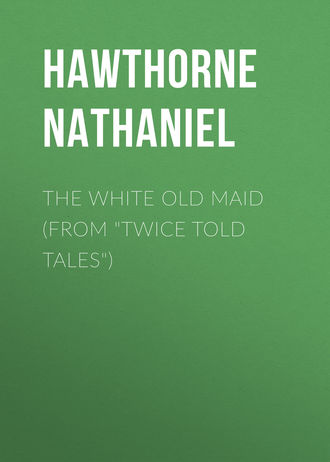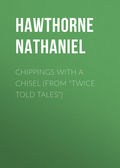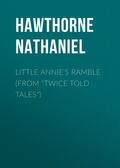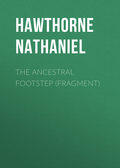
Натаниель Готорн
The White Old Maid (From "Twice Told Tales")
Still, years went on, and still she followed funerals, and was not yet summoned to her own festival of death. One afternoon, the great street of the town was all alive with business and bustle, though the sun now gilded only the upper half of the church-spire, having left the housetops and loftiest trees in shadow. The scene was cheerful and animated, in spite of the sombre shade between the high brick buildings. Here were pompous merchants, in white wigs and laced velvet; the bronzed faces of sea-captains; the foreign garb and air of Spanish creoles; and the disdainful port of natives of Old England; all contrasted with the rough aspect of one or two hack settlers, negotiating sales of timber, from forests where axe had never sounded. Sometimes a lady passed, swelling roundly forth in an embroidered petticoat, balancing her steps in high-heeled shoes, and courtesying, with lofty grace, to the punctilious obeisances of the gentlemen. The life of the town seemed to have its very centre not far from an old mansion, that stood somewhat back from the pavement, surrounded by neglected grass, with a strange air of loneliness, rather deepened than dispelled by the throng so near it. Its site would have been suitably occupied by a magnificent Exchange, or a brick block, lettered all over with various signs; or the large house itself might have made a noble tavern, with the “King’s Arms” swinging before it, and guests in every chamber, instead of the present solitude. But, owing to some dispute about the right of inheritance, the mansion had been long without a tenant, decaying from year to year, and throwing the stately gloom of its shadow over the busiest part of the town. Such was the scene, and such the time, when a figure, unlike any that have been described, was observed at a distance down the street.
“I espy a strange sail, yonder,” remarked a Liverpool captain; “that woman in the long, white garment!”
The sailor seemed much struck by the object, as were several others, who, at the same moment, caught a glimpse of the figure that had attracted his notice. Almost immediately, the various topics of conversation gave place to speculations, in an undertone, on this unwonted occurrence.
“Can there be a funeral, so late this afternoon?” inquired some.
They looked for the signs of death at every door, – the sexton, the hearse, the assemblage of black-clad relatives, – all that makes up the woeful pomp of funerals. They raised their eyes, also, to the sun-gilt spire of the church, and wondered that no clang proceeded from its bell, which had always tolled till now, when this figure appeared in the light of day. But none had heard that a corpse was to be borne to its home that afternoon, nor was there any token of a funeral, except the apparition of the “Old Maid in the Winding-Sheet.”
“What may this portend?” asked each man of his neighbor.
All smiled as they put the question, yet with a certain trouble in their eyes, as if pestilence, or some other wide calamity, were prognosticated by the untimely intrusion among the living, of one whose presence had always been associated with death and woe. What a comet is to the earth, was that sad woman to the town. Still she moved on, while the hum of surprise was hushed at her approach, and the proud and the humble stood aside, that her white garment might not wave against them. It was a long, loose robe, of spotless purity. Its wearer appeared very old, pale, emaciated, and feeble, yet glided onward, without the unsteady pace of extreme age. At one point of her course, a littly rosy boy burst forth from a door, and ran, with open arms, towards the ghostly woman, seeming to expect a kiss from her bloodless lips. She made a slight pause, fixing her eye upon him with an expression of no earthly sweetness, so that the child shivered and stood awe-struck, rather than affrighted, while the Old Maid passed on. Perhaps her garment might have been polluted even by an infant’s touch; perhaps her kiss would have been death to the sweet boy, within a year.







